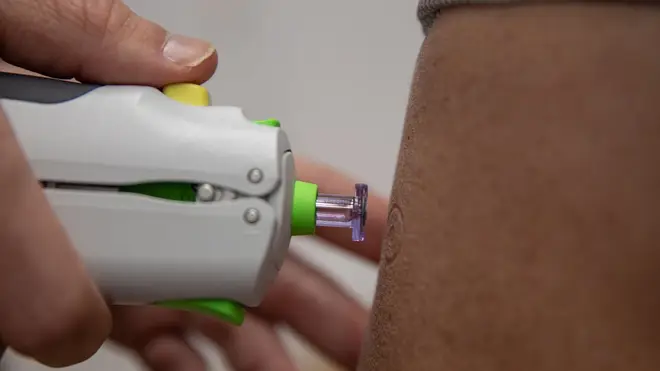
Oli Dugmore 4am - 7am
14 December 2021, 07:34 | Updated: 14 December 2021, 14:12

A new needle-free Covid-19 vaccine that could give "wide-ranging protection" against variants and future coronaviruses is being trialled in the UK.
The vaccine, developed by the University of Southampton, uses a jet of air to push it through the skin rather than a needle.
Now volunteers from the Southampton area who have had two doses of an existing vaccine but not a booster are being sought for the trial for which they will be paid £785.
READ MORE: PM appeals for 'tens of thousands' of volunteers to help Covid booster jab roll out
READ MORE: Huge demand for Covid boosters as all adults in England become eligible
Saul Faust, clinical chief investigator and director of the NIHR Southampton Clinical Research Facility, said: "This isn't simply 'yet another' coronavirus vaccine as it has both Covid-19 variants and future coronaviruses in its sights.
"This technology could give wide-ranging protection to huge numbers of people worldwide."
Most existing Covid-19 vaccines use the RNA sequence for the spike protein from the first samples of virus found in January 2020.
The DIOSvax technology used for the new vaccine aims to predict how the virus could mutate, allowing it to target emerging variants.

'I can't accept the principle of compulsory vaccination in the UK'
Professor Jonathan Heeney, at the University of Cambridge who helped developed the vaccine with research company DIOSynVax, said: "As new variants emerge and immunity begins to wane we need newer technologies.
"It's vital that we continue to develop new generation vaccine candidates ready to help keep us safe from the next virus threats.
"Our vaccine is innovative, both in terms of the way it primes the immune system to respond with a broader protective response to coronaviruses, and how it is delivered.
"Crucially, it is the first step towards a universal coronavirus vaccine we are developing, protecting us not just from Covid-19 variants but from future coronaviruses."